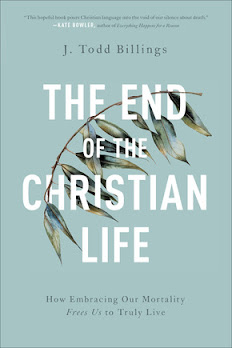"The End of the Christian Life" by J. Todd Billings. A Review
The
End of the Christian Life: How Embracing Our Mortality Frees Us to Truly Live
J. Todd Billings
Brazos Press
ISBN: 9781587434204; September 2020; $19.99
Today, it came at me again. I was teaching a small group of people at our State Capitol and we were hunkered down examining James 4:13-17. James was correcting the brazen outlook that thinks we have control of our lives and our outcomes, while not having God anywhere in the equation (4:13). And part of James’s remedy was to point out that in light of our brevity (4:14) what we should say is, “If the Lord wills, we will live and do this or that” (4:15). If the Lord – the Lord Jesus Christ (1:1 and 2:1) wills, we will live…and then engage in our activities. And that thought is what “The End of the Christian Life: How Embracing Our Mortality Frees Us to Truly Live” occupies itself with in 240 softback pages. The author, J. Todd Billings, Gordon H. Girod Research Professor of Reformed Theology at Western Theological Seminary in Holland, Michigan, an ordained minister in the Reformed Church in America, and author of numerous studies, has some skin in this game as he faces his own incurable cancer. It’s not a book for the light-of-heart, but for the live-at-heart! This volume is a must-read for anyone who claims to believe in the Christ of Good Friday and Easter Morning. As Billings states it, the “strange thesis of this book is that whether you are nineteen or ninety-nine, whether you are healthy or sick, or whether the future looks bright or bleak, true hope does not involve closing over the wound of death. Instead, even the wound can remind us who we are: beloved, yet small and mortal children of God, bearing witness to the Lord of creation who will set things right on the final day.”
The author takes readers through an extended meditation on our mortality beginning with our plunge into Sheol, that dark pit that can encircle us even while living. He moves on to two views of death among ancient Christians that, with Irenaeus, sees death as a relief, and with Augustine, perceives death as the enemy. Further, Billings addresses how we mere mortals delude ourselves with dreams of invincibility and immortality, especially in the face of modern medicine. Next, he graciously takes on the prosperity gospel and its anemic cousins, showing how Christians appear to be three times as likely to grasp at extreme medical measures that will only marginally extend their lives. Finally, the author wraps up his material with a glance over the cloudy ridge into the canyon vistas beyond. In these two chapters, he comes at Near Death Experiences (NDE) from a sagacious and pastoral posture, and looks at the differences between what happens when we die, and the glorious day of Christ’s return when he raises all of his people from the dead. We are forced to contemplate what we expect to meet in the end; “The difference is between expecting oblivion and expecting God. Christian hope expects God to be the unrivaled King in the end, so that sin, the devil, and even death will be destroyed.”
Much of the material is challenging, sobering, and enlightening! There were times Billings had me in tears (especially when retelling the stories of “Jack” and “Claude”), and other times he had me walking around the house and yard thinking hard. The author doesn’t shy away from the important topics, like the Day of Judgment and why it is such good news; that NDEs are not revelatory and therefore not a guide; how the Scriptures repeatedly emphasize that Christians actually should expect a life of unexplained suffering; and that the Christian hope is not in life extension or healing, but eternal life with the Father, and the Son and the Holy Spirit, boundlessly! In the end, Billings helps us to recognize that “our mortal limits can lighten our load and deepen our joy. We are small, and the world is not on our shoulders.”
“The End of the Christian Life” is THE book to get this year, especially as the Lord of heaven and earth has given us a good reason to pause, reset, and reboot (2020 and COVID19). This would be a healthy gift for your loved ones, and for you to read yourself. Church leaders and laity should snatch up a copy as it comes out and make this manuscript a priority. Seminaries must require their students to delve deep into its pages and ponder its gravities. I highly recommend this volume, and plan to make numerous copies available to my congregation.
My gratitude goes out to the author
and publisher who invited me to be part of the book’s “launch team” and supplied
me with a pre-published electronic copy of the volume. They made not stipulations
on me, offered me no bribes, nor promised me riches and wealth untold.
Therefore, I can say unashamedly that this analysis is all mine, freely made
and freely given.




Comments